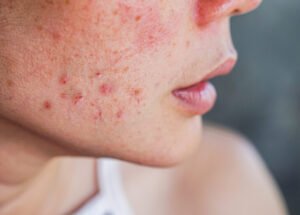Skin changes such as spots, itching, or redness can be warning signs. A UNAM dermatologist explains how to identify them and what to do in each case.
The skin, in addition to being the largest organ in the human body, performs vital functions such as thermal regulation, protection against external aggressors, and detection of environmental stimuli.
However, it also acts as a mirror of our internal health, so any visible changes, such as irritation, blemishes, or discoloration, can be a sign of an underlying condition.
Dr. Rodrigo Roldán Marín, a dermatologist who graduated from UNAM and is a specialist in dermoscopy, explained on the Hipócrates 2.0 program, broadcast on Radio UNAM and PUIREE, what the most common skin diseases are, their triggers, and how to properly address them to protect skin health.
Acne: hormonal causes, food myths, and dermatological treatment
Acne is one of the most common skin conditions, especially during adolescence. It usually begins between the ages of 11 and 12 and can last until the age of 19. This condition is caused by an increase in hormones that stimulate the sebaceous glands, generating excess sebum that clogs pores.
This environment favors the proliferation of the bacteria Cutibacterium acnes, responsible for inflammation and the appearance of characteristic lesions. According to Dr. Roldán, treatment should be personalized and may include deep cleansing, bacterial control, sebum regulation, and inflammation reduction.
Contrary to popular belief, foods like chocolate or nuts do not aggravate acne. “The only scientifically proven thing is that dairy can worsen the condition due to the hormones in cow’s milk. It’s not about eliminating them, but rather moderating their consumption,” the specialist pointed out.
She also recommended avoiding the use of oily cosmetics on acne-prone skin. “Applying oily makeup on oily skin is like adding fuel to the fire,” she warned. She also urged parents to pay emotional attention to their children, as severe acne can affect mental health.
Atopic dermatitis: how to identify and control this skin inflammation
Atopic dermatitis is a chronic inflammatory disease that affects people with sensitive skin. It is triggered by environmental factors (such as pollen or weather), chemicals (soaps or detergents), and emotional factors (stress). It usually manifests as intense itching that leads to scratching and worsening inflammation.






















+ There are no comments
Add yours